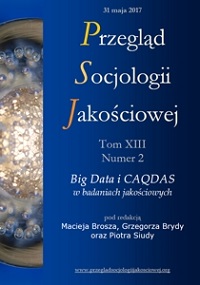From a qualitative researcher’s workshop – the characteristics of applying computer software in studies based on the grounded theory methodology
DOI:
https://doi.org/10.18778/1733-8069.13.2.03Keywords:
Computer aided qualitative data analysis, NVivo, grounded theory methodology, studies into sport of persons with disabilitiesAbstract
The purpose of the article is to show how computer aided qualitative data analysis tools can be utilized in research practice. Based on the example of a particular research project, I make an attempt to describe how studies are performed pursuant to the procedures of the grounded theory methodology, using NVivo software. This is a presentation of a workshop of a qualitative researcher who uses computer software to aid the research process on a daily basis. At the same time, I stress the existing improvements, but also the consequences and potential difficulties related to the application of computer software in qualitative research. The article is of a review and educational character, and it is intended to familiarize the reader with the possibilities of a tool belonging to CAQDAS and its real application in carrying out a research project based on a selected research method.
Downloads
References
Bringer, Joy D., Lynne H. Johnston, and Celia H. Brackenridge. 2004. “Maximizing Transparency in a Doctoral Thesis: The Complexities of Writing about the Use of QSR*NVIVO within a Grounded Theory Study.” Qualitative Research 4(2):247-265.
Google Scholar
DOI: https://doi.org/10.1177/1468794104044434
Bringer, Joy D., Lynne H. Johnston, and Celia H. Brackenridge. 2006. “Using Computer-Assisted Qualitative Data Analysis Software to Develop a Grounded Theory Project.” Field Methods 18(3):245-266.
Google Scholar
DOI: https://doi.org/10.1177/1525822X06287602
Charmaz, Kathy and Richard G. Mitchell. 2001. “Grounded Theory in Ethnography.” Pp. 160-174 in Handbook of Ethnography, edited by Paul Atkinson. London: Sage.
Google Scholar
DOI: https://doi.org/10.4135/9781848608337.n11
Coffey, Amanda, Beverly Holbrook, and Paul Atkinson. 1996. “Qualitative Data Analysis: Technologies and Representations.” Sociological Research Online 1(1). Retrieved May 06, 2015 http://www.socresonline.org.uk/1/1/4.html
Google Scholar
Fielding, Nigel and Raymond Lee M. 1998. Computer Assisted Qualitative Research. Newbury Park: Sage.
Google Scholar
Gibbs, Graham. 2011. Analizowanie danych jakościowych. Translated by Maja Brzozowska-Brywczyńska. Warszawa: PWN.
Google Scholar
Glaser, Barney G. 1978. Theoretical Sensitivity. San Francisco: The Sociology Press.
Google Scholar
Glaser, Barney G. and Anselm L. Strauss. 1967. The Discovery of Grounded Theory. Strategies for Qualitative Research. Chicago: Aldine Publishing Company.
Google Scholar
Gorzko, Marek. 2008. Procedury i emergencja. O metodologii klasycznych odmian teorii ugruntowanej. Szczecin: Wydawnictwo Naukowe Uniwersytetu Szczecińskiego.
Google Scholar
Hammersley, Martyn and Atkinson Paul. 2000. Metody badań terenowych. Translated by Sławomir Dymczyk. Poznań: Wydawnictwo Zysk i S-ka.
Google Scholar
Kelle, Udo. 1997a. “Theory Building in Qualitative Research and Computer Programs for the Management of Textual Data.” Sociological Research Online 2(2). Retrieved May 06, 2015 http://www.socresonline.org.uk/socresonline/2/2/1.html
Google Scholar
DOI: https://doi.org/10.5153/sro.86
Kelle, Udo. 1997b. Computer-Assisted Analysis of Qualitative Data. Paper prepared for the Discussion paper series of the LSE Methodology Institute by University of Bremen, August 1997.
Google Scholar
Kelle, Udo. 2005. “Computer-Assisted Qualitative Data Analysis.” Pp. 473-490 in Qualitative Research Practis, edited by Clive Seale et al. London, Thousand Oaks, New Delhi: Sage.
Google Scholar
Konecki, Krzysztof. 2000. Studia z metodologii badań jakościowych. Teoria ugruntowana. Warszawa: PWN.
Google Scholar
Lofland, John et al. 2009. Analiza układów społecznych. Prze-wodnik metodologiczny po badaniach jakościowych. Translated by Anna Kordasiewicz, Sylwia Urbańska, and Monika Żychlińska. Warszawa: Wydawnictwo Naukowe Scholar.
Google Scholar
Lonkila, Markku. 1995. “Grounded Theory as an Emerging Paradigm for Computer-Assisted Qualitative Data Analysis.”
Google Scholar
Miles, Matthew B. and Michael A. Huberman. 2000. Analiza danych jakościowych. Translated by Stanisław Zabielski. Białystok: Transhumana.
Google Scholar
Morse, Janice M. and Lyn Richards. 2002. Readme First for a User’s Guide to Qualitative Methods. Thousand Oaks, London, New Delhi: Sage.
Google Scholar
Muhr, Thomas and Susanne Friese (2003/2004) User’s Manual for ATLAS.ti 5.0. Berlin: Scientific Software Development.
Google Scholar
Niedbalski, Jakub. 2014. Komputerowe wspomaganie analizy danych jakościowych. Zastosowanie oprogramowania NVivo i Atlas.ti w projektach badawczych opartych na metodologii teorii ugruntowanej. Łódź: Wydawnictwo UŁ.
Google Scholar
DOI: https://doi.org/10.18778/7969-060-2
Niedbalski, Jakub and Izabela Ślęzak. 2014. „Główne funkcje programu NVivo a procedury metodologii teorii ugruntowanej, czyli jak realizować badanie oparte na MTU, korzystając z oprogramowania CAQDA?” Pp. 77-92 in Metody i techniki odkrywania wiedzy. Narzędzia CAQDAS w procesie analizy danych jakościowych, edited by Jakub Niedbalski. Łódź: Wydawnictwo UŁ.
Google Scholar
Niedbalski, Jakub and Izabela Ślęzak. 2012. „Analiza danych jakościowych przy użyciu programu NVivo a zastosowanie procedur metodologii teorii ugruntowanej.” Przegląd Socjologii Jakościowej 8(1):126-165. Retrieved May 06, 2015 http://www.przegladsocjologiijakosciowej.org
Google Scholar
DOI: https://doi.org/10.18778/1733-8069.8.1.07
Seale, Clive. 2008. „Wykorzystanie komputera w analizie danych jakościowych.” Pp. 233-256 in Prowadzenie badań jakościowych, edited by David Silverman. Warszawa: PWN.
Google Scholar
Strauss, Anselm L. 1987. Qualitative Analysis for Social Scientists. Cambridge: University Press Cambridge.
Google Scholar
DOI: https://doi.org/10.1017/CBO9780511557842
Strauss, Anselm L. and Juliet Corbin. 1990. Basics of Qualitative Research. London, New Delhi: Sage.
Google Scholar
Wiltshier, Fiona. 2011. “Researching With NVivo.” Forum: Qualitative Social Research 12(1). Retrieved May 06, 2015 http://www.qualitative-research.net/index.php/fqs/issue/view/36
Google Scholar
Downloads
Published
How to Cite
Issue
Section
License

This work is licensed under a Creative Commons Attribution-NonCommercial-NoDerivatives 4.0 International License.














